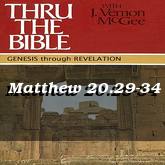"Launch out into the deep, and let down your nets for a draught."
—Luke 5:4
Morning Thought
We learn from this narrative, the necessity of human agency. The draught of fishes was miraculous, yet neither the fisherman nor his boat, nor his fishing tackle were ignored; but all were used to take the fishes. So in the saving of souls, God worketh by means; and while the present economy of grace shall stand, God will be pleased by the foolishness of preaching to save them that believe. When God worketh without instruments, doubtless he is glorified; but he hath himself selected the plan of instrumentality as being that by which he is most magnified in the earth. Means of themselves are utterly unavailing. "Master, we have toiled all the night and have taken nothing." What was the reason of this? Were they not fishermen plying their special calling? Verily, they were no raw hands; they understood the work. Had they gone about the toil unskilfully? No. Had they lacked industry? No, they had toiled. Had they lacked perseverance? No, they had toiled all the night. Was there a deficiency of fish in the sea? Certainly not, for as soon as the Master came, they swam to the net in shoals. What, then, is the reason? Is it because there is no power in the means of themselves apart from the presence of Jesus? "Without him we can do nothing." But with Christ we can do all things. Christ's presence confers success. Jesus sat in Peter's boat, and his will, by a mysterious influence, drew the fish to the net. When Jesus is lifted up in his Church, his presence is the Church's power-the shout of a king is in the midst of her. "I, if I be lifted up, will draw all men unto me." Let us go out this morning on our work of soul fishing, looking up in faith, and around us in solemn anxiety. Let us toil till night comes, and we shall not labour in vain, for he who bids us let down the net, will fill it with fishes.
Ⓒ 1996-2017 Heartlight, Inc. This material may not be reproduced in part or whole for commercial use without written consent. Written by Charles H. Spurgeon.
 View the full article
View the full article
—Luke 5:4
Morning Thought
We learn from this narrative, the necessity of human agency. The draught of fishes was miraculous, yet neither the fisherman nor his boat, nor his fishing tackle were ignored; but all were used to take the fishes. So in the saving of souls, God worketh by means; and while the present economy of grace shall stand, God will be pleased by the foolishness of preaching to save them that believe. When God worketh without instruments, doubtless he is glorified; but he hath himself selected the plan of instrumentality as being that by which he is most magnified in the earth. Means of themselves are utterly unavailing. "Master, we have toiled all the night and have taken nothing." What was the reason of this? Were they not fishermen plying their special calling? Verily, they were no raw hands; they understood the work. Had they gone about the toil unskilfully? No. Had they lacked industry? No, they had toiled. Had they lacked perseverance? No, they had toiled all the night. Was there a deficiency of fish in the sea? Certainly not, for as soon as the Master came, they swam to the net in shoals. What, then, is the reason? Is it because there is no power in the means of themselves apart from the presence of Jesus? "Without him we can do nothing." But with Christ we can do all things. Christ's presence confers success. Jesus sat in Peter's boat, and his will, by a mysterious influence, drew the fish to the net. When Jesus is lifted up in his Church, his presence is the Church's power-the shout of a king is in the midst of her. "I, if I be lifted up, will draw all men unto me." Let us go out this morning on our work of soul fishing, looking up in faith, and around us in solemn anxiety. Let us toil till night comes, and we shall not labour in vain, for he who bids us let down the net, will fill it with fishes.
Ⓒ 1996-2017 Heartlight, Inc. This material may not be reproduced in part or whole for commercial use without written consent. Written by Charles H. Spurgeon.


 Let's lift up Threynorlake's need for articles. "And we know that in all things God works for the good of those who love him" (Rom 8:28). Trusting Jesus to provide the necessary resources. In Jesus' name!
Let's lift up Threynorlake's need for articles. "And we know that in all things God works for the good of those who love him" (Rom 8:28). Trusting Jesus to provide the necessary resources. In Jesus' name! 
 **Prayer Updates!**
**Prayer Updates!**  **Salvation**: Let's pray for
**Salvation**: Let's pray for 


 In Jesus' name!
In Jesus' name! 


